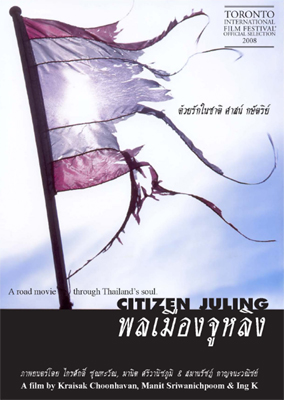 I just got the full schedule for the Bangkok International Film Festival and was surprised to see two screenings scheduled for the wide-ranging, politically charged documentary Citizen Juling. It will be screened as part of the Documentary Showcase.
I just got the full schedule for the Bangkok International Film Festival and was surprised to see two screenings scheduled for the wide-ranging, politically charged documentary Citizen Juling. It will be screened as part of the Documentary Showcase.I have never been more pleased to be wrong, as I said in my previous post about Citizen Juling, that I doubted it would ever be screened (publicly) in Thailand. But politics in Thailand at the moment are very fluid and subject to rapid, unbelievable changes that make predictions, forecasts and promises frequently wrong and unfulfilled.
Directed by filmmaker Ing K, artist-photographer Manit Sriwanichpoom and activist politician Kraisak Choonhavan, Citizen Juling documents the abduction and beating death of Juling Pongkunmul, a young Buddhist woman who went to restive southern Thailand to teach kindergarten art. The documentary had its world premiere last week at the Toronto International Film Festival.
Another surprise is The Betrayal (Nerakhoon), a biographical documentary by cinematographer Ellen Kuras and Laotian filmmaker Thavisouk Phrasavath. It is also politically sensitive, covering the time of the Laotian Civil War in the 1970s. The film was featured in competition at this year's Sundance Film Festival and was also at SilverDocs.
In the film, Thavisouk traces his story back to Laos, where his father was a member of the Royal Laotian army and fought for the CIA in the American "Secret War" against the community Pathet Lao. The father was sent to a re-education camp and Thavi, his mother and nine siblings fled across the Mekong to a refugee camp in Thailand. From, there they migrated to America in 1981, where they found themselves cramped in a room in a Brooklyn slum.
Here's more from a Cinematical review:
Kuras first met Thavi four years later, in 1985, when she was looking for someone who could teach her Laotian. She met Thavi, the two became friends, and after hearing his personal history, she knew she wanted to tell his tale. Nerakhoon (The Betrayal) is a visually beautiful film -- a combination of cinema verite and archival footage with elements of experimental filmmaking blended in as well. The film is simultaneously a micro view of this one family's struggles to survive in and adapt to a foreign culture in the aftermath of war, and a macro statement about the fight of immigrants to retain a sense of self-identity, sense of culture and sense of self while assimilating to a new environment. The larger story could have been told through the lens of any immigrant group -- refugees from Laos, Cambodia or Vietnam as a result of that conflict, or immigrants from Mexico today, or even the struggle of Native American tribes in the United States struggling to maintain tribal identities in a modern world.
A word or two about the festival schedule: The programmers are not messing around. Each day, from start to end, is wall-to-wall screenings. It starts at noon on Tuesday (September 23) with Vicky Cristina Barcelona. Daily showtimes start around 11.30am or noon and there's three afternoon timeslots with five cinemas going full tilt showing festival movies.
I'm told the best way to get tickets is to show up at SF World Cinema on Thursday (September 18) and book them all then. There's a package available that has 10 tickets for 900 baht.
Citizen Juling plays at 4.45pm on September 26 and at 2pm on September 29. The film is 222 minutes long, so takes up two timeslots. The directors are scheduled to be present for Q&A sessions at both screenings. The Betrayal screens at 1pm on September 27 and at 2pm on September 29.
(Thanks Aeh & Paul!)


Why is the marketing for this film festival very low key? It's so hard to find info!!! :)
ReplyDeleteDo you know if there's another type of ticket, like VIP?
VIP seating arrangements are generally reserved for filmmakers and jurors.
ReplyDeleteThe rest will have to stand in line and get tickets. I have tickets in hand after going to SF World Cinema, getting the 900-baht pack of vouchers and booking seats for everything I'm able to see.
The schedule is downloadable as a PDF from the festival website.